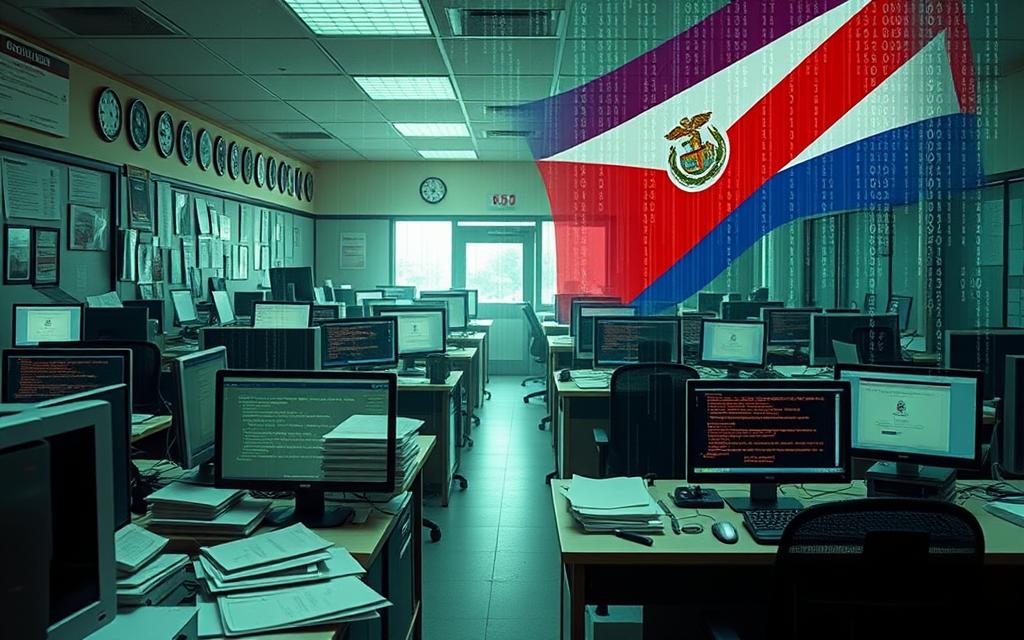Costa Rica’s immigration office, the DGME, has faced a cyberattack for the second time. This attack started on November 19th. It has made the office’s website unavailable, causing a cybersecurity crisis.
Even with the attack, the DGME says important services are still working. These include managing who comes and goes, handling paperwork, and giving out documents. The office is using new security steps to fight the attack and keep people’s data safe.
Key Takeaways
- The Directorate General of Migration and Immigration (DGME) in Costa Rica has experienced a second cyberattack, disrupting the institution’s website.
- The attack has been ongoing for 72 hours, but essential services such as migration control, regularization, and documentation remain operational.
- The DGME has implemented security protocols and tools to contain the attack and safeguard public information.
- The incident raises concerns about the cybersecurity vulnerabilities of Costa Rica’s immigration system and the need for robust data protection measures.
- The government’s response and efforts to address the attack will be closely watched by the public and international community.
Recent Cybersecurity Breach at DGME
On November 19, 2024, the Directorate General of Migration and Foreigners (DGME) in Costa Rica found a serious cybersecurity breach. They quickly started their security plans and took steps to stop the threat.
Timeline of the Attack Detection
The breach was spotted on November 19th. The DGME’s tech team has been working non-stop. They are trying to figure out how big the breach is and who did it.
Initial Response and Security Protocols
The DGME quickly set up new security steps to protect immigration policies, visa requirements, legal residency, and more. They worked with national security groups to keep the threat under control. This helps keep foreign nationals‘ data safe.
Current Status of Immigration Services
Even with the breach, the DGME says its main systems are working fine. The regularization processes and documentation services for DIMEX and passports are still going on. This means important services for immigration policies and legal residency keep running.

“We are committed to ensuring the safety and security of our systems and the personal information entrusted to us by foreign nationals. Our team is working tirelessly to address this incident and restore full functionality as soon as possible.”
– DGME Spokesperson
Immigration in Costa Rica Hacked -Again-: Impact on Essential Services
A cyber attack hit Costa Rica’s immigration system, causing worry. But the government says all key services are still working. The immigration control systems and security at borders are running smoothly.
The DGME’s website is down, but no public info was stolen. The government is working hard to fix the problem and get everything back to normal.
The attack didn’t really affect document fraud, border control, or immigration services much. The DGME has set up emergency plans to keep services going and protect the system.
“We are committed to ensuring that the public’s access to our services remains uninterrupted. Our top priority is to safeguard the security and privacy of all individuals who rely on our immigration services.”
This cyber attack shows the ongoing fight to keep Costa Rica’s systems safe. The government is focused on improving cybersecurity to stop future attacks. They want to keep border control and document fraud prevention strong.

Government Response and Security Measures
The Costa Rican government quickly acted after a cybersecurity breach at the Directorate General of Migration and Foreigners (DGME). Minister of Security Mario Zamora gave a clear statement about the government’s actions. He talked about how they are working to keep the country’s data safe.
Minister Mario Zamora’s Official Statement
At a press conference, Minister Zamora said the cybersecurity measures worked to stop the cyber attack on the DGME. “Our team has been working non-stop to tackle this threat and keep our government response services running,” Zamora said. He also promised to protect Costa Rica’s data and keep its information technology safe.
Implementation of Emergency Protocols
The Costa Rican government quickly put in place emergency plans to deal with the cyber attack. These plans include:
- Deploying a team of cybersecurity experts to assess the breach and strengthen cybersecurity measures.
- Starting a detailed investigation to find the source of the attack and stop future ones.
- Improving security and data backup for all government institutions to better protect data protection.
Coordination with Security Agencies
The DGME is working closely with Costa Rica’s security agencies. This includes the Judicial Investigation Police and the Department of Information Security. “We are dedicated to defending our nation’s sovereignty and the safety of our information systems,” Zamora said.
Pattern of Cyber Attacks in Costa Rica
The recent cybersecurity threats and data breaches in Costa Rica are a big worry. Just a week after the digital security issue at the Directorate General of Migration and Foreigners (DGME), the country has seen more cyber attacks.
On the previous Wednesday, the Refinadora Costarricense de Petróleo (Recope), the state-owned oil refinery, was hit by a ransomware attack. Grupo Repretel, a well-known media company, reported a cyber attack over the weekend. They said at least 10 companies in Costa Rica and over 200 in Mexico were hit in the last 48 hours.
The banking sector in Costa Rica claims it has not been hit by these cybersecurity threats. But, the United States, a key partner in security, is helping the Costa Rican government. They are working together to tackle these urgent data breaches.
“The recent wave of cyber attacks in Costa Rica is a concerning trend that requires immediate attention and a coordinated response from both the public and private sectors,” said a cybersecurity expert familiar with the situation.
As Costa Rica deals with these digital security issues, it’s clear a strong plan is needed. This plan must protect important infrastructure and services from cyber attacks.
Conclusion
The recent cyber attack on Costa Rica’s immigration system is a wake-up call. It shows how serious the threat of cybersecurity breaches is and has been over the recent years. The DGME has kept services running, but it highlights the need for better security and teamwork.
Cyber attacks are happening all over the world, hitting different sectors in Costa Rica. It’s clear that fighting these threats is a global problem. We need to focus on immigration system security, cyber threat prevention, and working together internationally.
Costa Rica’s response to this attack will help the world fight cyber threats better. By staying alert, using new tech, and building strong partnerships, we can protect our citizens. Together, we can keep our systems safe from cyber attacks.



